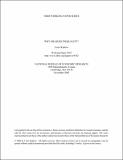| dc.contributor.author | Kaplow, Louis | |
| dc.date.accessioned | 2013-05-07T17:59:36Z | |
| dc.date.issued | 2005 | |
| dc.identifier.citation | Louis Kaplow, Journal of Economic Inequality, 3 J. Econ. Ineq. 65 (2005). | en_US |
| dc.identifier.issn | 1569-1721 | en_US |
| dc.identifier.uri | http://nrs.harvard.edu/urn-3:HUL.InstRepos:10611778 | |
| dc.description.abstract | A large body of literature is devoted to the measurement of income inequality, yet little attention is given to the question, Why measure inequality? However, the reasons for measurement bear importantly on whether and how measurement should be done. Upon examination, normative measures are found to be of questionable value. Descriptive measures, by contrast, may be useful, but the appropriate measure depends on the field of application rather than on general, a priori principles of the sort that are emphasized in the existing measurement literature. Measures of poverty are also considered, and similar conclusions are reached. | en_US |
| dc.language.iso | en_US | en_US |
| dc.publisher | Springer Verlag | en_US |
| dc.relation.isversionof | http://dx.doi.org/10.1007/s10888-004-7947-7 | en_US |
| dc.relation.hasversion | http://ideas.repec.org/p/nbr/nberwo/9342.html | en_US |
| dash.license | LAA | |
| dc.title | Why Measure Inequality | en_US |
| dc.type | Journal Article | en_US |
| dc.description.version | Accepted Manuscript | en_US |
| dc.relation.journal | Journal of Economic Inequality | en_US |
| dash.depositing.author | Kaplow, Louis | |
| dc.date.available | 2013-05-07T17:59:36Z | |
| dc.identifier.doi | 10.1007/s10888-004-7947-7 | * |
| dash.contributor.affiliated | Kaplow, Louis | |


